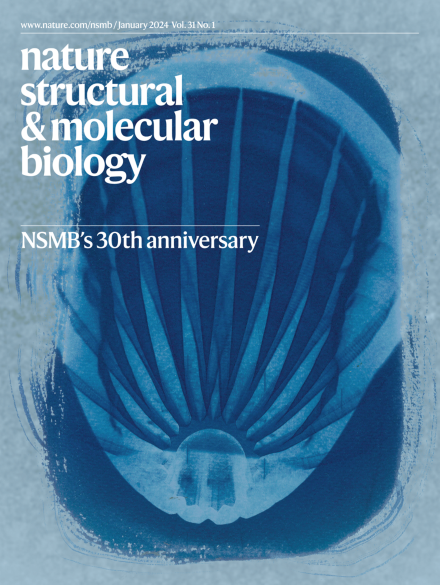恶唑烷酮类抗生素对翻译特异性抑制的结构基础
IF 16.8
1区 生物学
引用次数: 0
摘要
抗生素利奈唑胺是临床批准的第一个恶唑烷酮类成员,通过结合肽基转移酶中心抑制细菌核糖体的翻译。最近的研究表明,利奈唑胺并不抑制所有序列的肽键形成,而是以特定的方式起作用,即当丙氨酸占据新生链的倒数第二个位置时。在这项研究中,我们确定第二代恶唑烷酮雷德唑啉也诱导丙氨酸在倒数第二位置失速。然而,这些抑制剂上下文特异性的分子基础尚未阐明。在这项研究中,我们确定了利奈唑胺和雷德唑胺核糖体复合物的高分辨率冷冻电镜结构。这些结构表明丙氨酸侧链与恶唑烷酮产生的小疏水缝隙吻合,从而改善了核糖体的结合。通过抗生素抗性酶Cfr对核糖体的修饰,迫使抗生素采用缩小疏水丙氨酸口袋的构象,从而破坏了拖延。总之,在这项工作中提出的结构和生化发现提供了对临床重要的恶唑烷酮抗生素对翻译的上下文特异性抑制的分子理解。本文章由计算机程序翻译,如有差异,请以英文原文为准。
Structural basis for context-specific inhibition of translation by oxazolidinone antibiotics
The antibiotic linezolid, the first clinically approved member of the oxazolidinone class, inhibits translation of bacterial ribosomes by binding to the peptidyl transferase center. Recent work has demonstrated that linezolid does not inhibit peptide bond formation at all sequences but rather acts in a context-specific manner, namely when alanine occupies the penultimate position of the nascent chain. In this study, we determined that the second-generation oxazolidinone radezolid also induces stalling with alanine at the penultimate position. However, the molecular basis for context-specificity of these inhibitors has not been elucidated. In this study, we determined high-resolution cryo-EM structures of both linezolid and radezolid-stalled ribosome complexes. These structures reveal that the alanine side chain fits within a small hydrophobic crevice created by oxazolidinone, resulting in improved ribosome binding. Modification of the ribosome by the antibiotic resistance enzyme Cfr disrupts stalling by forcing the antibiotic to adopt a conformation that narrows the hydrophobic alanine pocket. Together, the structural and biochemical findings presented in this work provide molecular understanding of context-specific inhibition of translation by clinically important oxazolidinone antibiotics.
求助全文
通过发布文献求助,成功后即可免费获取论文全文。
去求助
来源期刊

Nature Structural &Molecular Biology
生物-生化与分子生物学
自引率
1.80%
发文量
160
期刊介绍:
Nature Structural & Molecular Biology is a monthly journal that focuses on the functional and mechanistic understanding of how molecular components in a biological process work together. It serves as an integrated forum for structural and molecular studies. The journal places a strong emphasis on the functional and mechanistic understanding of how molecular components in a biological process work together. Some specific areas of interest include the structure and function of proteins, nucleic acids, and other macromolecules, DNA replication, repair and recombination, transcription, regulation of transcription and translation, protein folding, processing and degradation, signal transduction, and intracellular signaling.
 求助内容:
求助内容: 应助结果提醒方式:
应助结果提醒方式:


